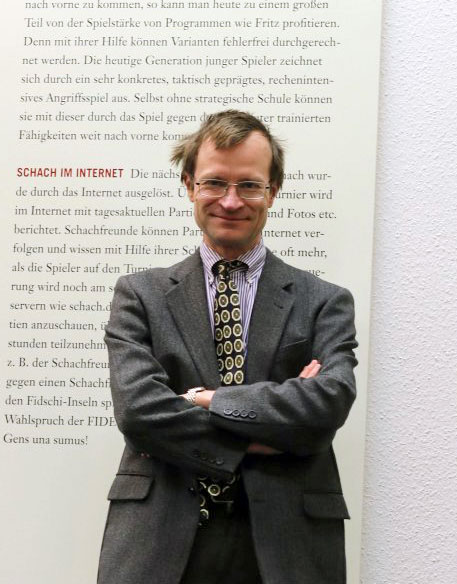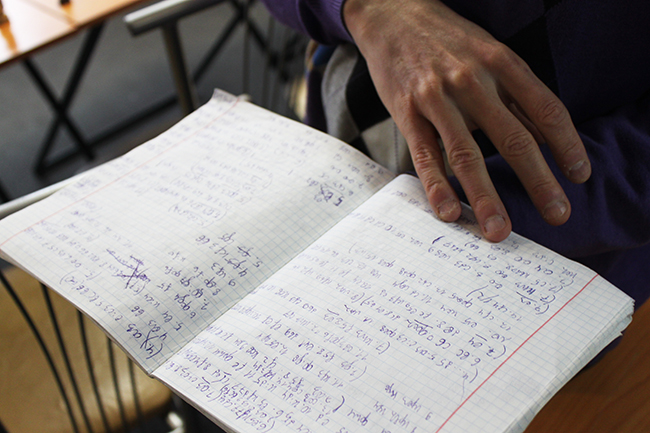


It’s a problem every player encounters when he stands better in a game: how to convert his plus into a full point? In this DVD the author answers this difficult question of chess strategy, considering both the psychological aspects of the realisation of an advantage and the technical methods.
A few weeks back, from January 3rd to 12th, the Belorussian Chess Federation hosted youth training camps in Orsha, one of the oldest towns in Belarus that dates back to the eleventh century. Seven young chess players with Elo ratings over 2150 participated: Mikhail Nikitenko, Olga Badelko, Vyacheslav Zarubitsky, Maxim Tsaruk, Gleb Galkin, Denis Lazovik and Artem Sinyavsky.

Grandmaster Sergei Tiviakov led a ten-day training camp, the first of its kind for junior players in Belarus. In addition to the daily six-hour training sessions, a large part of the camp focused on fitness and recreation such as ice skating, bowling, swimming, etc.
At the end of January Sergey Tiviakov travelled to Hamburg and recorded ChessBase opening DVDs, which will be released soon.
Tiviakov has been one of ChessBase's more prolific authors and has covered a wide range of topics drawing on his decades of tournament praxis.
All Sergei Tviakov video series...
Tiviakov had high praise for his students:
"Since I've been travelling for a long time as a coach and have many young students, I had some clichéd ideas before the arrival. But the results exceeded my expectations. All participants were very purposeful, neat and physically fit. I had expected that they would tire quickly or not withstand the heavy load: ten days in a row, daily six hours of training is very hard. But everyone has done well, they have always been highly concentrated and have worked well from day one."
The Scandinavian with 3...Qd6 could just as well be called “The Tiviakov System”. On this DVD GM Sergei Tiviakov shows you everything you need to know to be able to play 3...Qd6 yourself at once.

Photo: Nadezhda Kravchuk
The following interview was for the federation's web site openchess.by:
How do you rate the level of the guys?
I expected weaker players. Many have potential and in the future, I certainly expect that they will show good results. Some guys I liked very much.
Can you be more specific?
Vyacheslav Zarubitsky, Mikhail Nikitenko, Olga Badelko are, in principle, already established chess players. There's not much more to say about them. But of the younger participants, Denis Lazovik made a very good impression on me. He understands certain points deeply enough and very often offers good solutions. Of course, one could mention all of them, because everyone tried and worked hard.
Are you satisfied with how the training went?
We made use of the time we had as efficiently as possible. Never before have I had a training camp for ten days which accomplished so much: the intensity and speed working through the study material were incredibly high. I haven't had this experience even training with much stronger players.
Why do you think that was so?
An important factor is discipline. No one was ever late. During classes, they did not talk or become distracted, did not play on phones and computers, did not distract others, and were engaged with chess constantly. This very good discipline is, in principle, unusual for young chess players. I was impressed. Of course, it is very pleasant to work in such an environment. You understand that your efforts are not in vain. I was also very impressed that during my lectures everyone was taking notes. Someone even used up several notebooks.
Learning from the World Champions
With famous classical examples from the works of the giants, the author talks in detail about principles of chess and methods of play that we can use during every stage of the game.

A student's notebook | Photo: Openchess.by
After six hours of classes, everyone was tired, back in their rooms they immediately entered the. Some even came to play a blitz or to solve some puzzles in the evenings. It is evident that the guys are very fond of chess, and not just there to pass the time. I was very pleased to work with this group.
Is there something that you've learned from the students over these ten days?
When you are young, you are ambitious, you want to achieve everything. With age, goals change, for some, they disappear completely. Their efficiency, dedication, motivation, and desire to achieve something is inspiring.
What is special about working with kids of this age?
What's special is working in groups where it is not always possible to work on the specific weaknesses and problems of each individual chess player. The study material must be based on general knowledge, geared toward the overall improvement of the students' game without taking into account the features of a specific player.
How would you describe your method of working as a trainer?
From the age of 7, I was a student at the Smyslov school, where there were outstanding trainers. I know that the teaching methods, the material that was taught to us, worked in my case and in the cases of other strong players who left the Smyslov school. I did not reinvent the wheel, but simply use the methods that are guaranteed to produce good results. Training or preparation methods should only be changed if there is no progress. There's a lot to discuss on this topic, but usually everyone I work with makes progress. Of course, much depends on independent work.
Periodic training camps are not a panacea. If it was that easy then after 1-2 camps you could immediately become a grandmaster. To really improve, independent work is essential. At the end of the camp, everyone got a program to follow on their own over the next few months until the next session. If chess players work on their own to meet their training goals goals, read books, start practising the openings that we have prepared, then we can talk about their future growth prospects. No matter how talented a chess player is, if he is not motivated and accustomed to practice, he will not go far.
Each of them in the next month and a half will have several tournaments affording the opportunity to prove themselves, to prove that they are growing, developing. I hope that my visit to Belarus was not the last and the work will continue. Then it will be possible to talk about some specific results, about the adaptation of the program’s work. Let's see how the cooperation will develop further.
Tell us about your impressions of Belarus?
This isn't my first time in Belarus. You could say my chess career began here. In 1989, I took first place in the USSR championship for juniors under 16 in Pinsk, and that opened the door to the chess world. And a few years ago, I played at the Bronstein Memorial in Minsk. In Belarus, I know my way around well, have many chess friends, miss nothing and feel at home. At this point, I would like to thank the Board of the Chess Federation in Belarus for inviting me to this training camp. I hope that cooperation will continue and soon bear fruit.
How to combat rare lines as Black
A complete repertoire for Black is set out to be used against moves such as 1.Nf3, 1.f4, 1.g3, 1.Nc3, 1.b3, 1.b4 and 1.g4. The author uses content from his own notebooks to provide a full explanation of how to proceed.

At a training session | Photo: Nadezhda Kravchuk
The participants in the training camp also shared their impressions.
Mikhail Nikitenko:
The Art of the Positional Exchange Sacrifice
The positional exchange sacrifice is one of the most powerful and fascinating strategic weapons in chess. On this DVD Sergey Tiviakov explains why the positional exchange sacrifice is such a strong weapon and how to use it.
From this training camp, my impressions are only positive because we have done a lot, both for the chess training as well as the physical conditioning. The exercises were varied, the cultural program was well organized. Also different from other training camps was the duration — we trained daily for six hours. During training, we switched between openings, strategy and tactics. Finally, we take home a training regimen, which is very helpful. I wanted to have a good working relationship, then discover my weaknesses and set new goals so that I can work in a specific direction. We have to work more on endgames. As Sergey Nikolaevich said, a tightening up the endgame will save points that I used to give up quite often. My next tournament is the Moscow Open, at the end of January.
Olga Badelko:
This training camp was extremely productive, although tiring. Next I have two tournaments and I have only four days to recover. Before the training camp, I wanted to improve tactically. But the coach is a more positional player and the exercises were mostly on strategy and openings. In this regard, I was very satisfied. After the camp, I feel more confident.
Vyacheslav Zarubitsky:
I liked the fact that I learned new opening ideas. I consider this very useful for myself because I have never played this way before. I learned new tricks, remembered some things that I had learned before. In advance of the camp, my goal was to improve my opening repertoire for both colours. The training helped me to recognise my strengths and weaknesses. Sergei Nikolaevich mostly avoids calculating variations but plays positionally. I am also like that. I believe that my forte is more positional play than tactics.
Maxim Tsaruk:
This was my second training camp. I really liked that we had physical activities in our free time and that our training program was very varied. Before the training camp, I had decided to find out what I had to work on, to heed the advice and recommendations of our trainer. I would like to thank all those who organized the training camp and the program. Soon I will participate in an international round-robin tournament in Orsha. A very important start for me.
Gleb Galkin:
The training sessions were good, the impressions positive. In the first half of the day, we have improved our defence, and in the afternoons we worked on openings. There were tactical exercises. This was my first training camp. The first training session was more familiar, we are used to solving positional tasks. The second one was theory-based, and I had to write down more there to practice at home later. We analysed many different types of positions, and the trainer taught defensive tricks, shared with us his experiences, showed us his view of things. The demands on us were very diverse. At first, it was hard to get used to working out right after getting up, but then we got used to it. In the evening we skated or played soccer.
Denis Lazovik:
In this training camp, we solved puzzles in the morning and did opening work in the afternoons. The tasks were difficult. In the evening we were on the ice rink, in the pool or playing soccer. I will do my best at the tournament in Orsha.
Artem Sinyavsky:
I liked the training camp: the conditions were good, a strong coach who explained everything clearly. I learned a lot, studied new openings. I can use this knowledge at the next tournament in Orsha.
Nadezhda Kravchuk (for openchess.by)